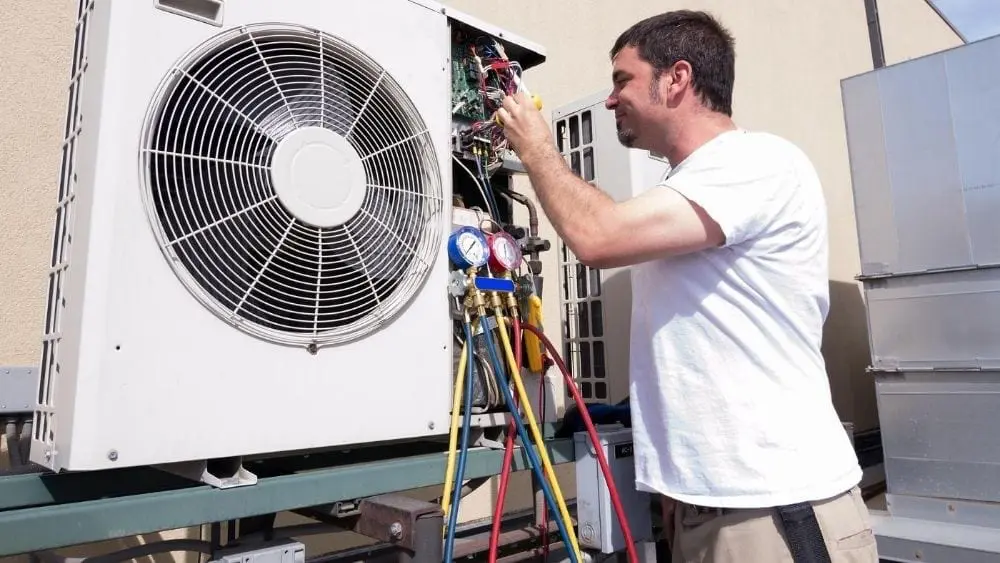
The middle of a blistering heat wave is no time to be without a reliable air conditioner.
The useful life of an air conditioner is around 10 to 15 years. If you’ve been diligent with seasonal routine maintenance, yours may perform well for longer. If you haven’t, you will likely begin noticing tell-tale signs of deterioration at around 10 years of service, according to the Department of Energy and HVAC contractors.
“Beyond the 10 year mark, you can expect an HVAC system to start costing you in repairs. They’ll also cost you more in energy bills as they lose efficiency,” notes Jimmy Hiller, president and CEO of Hiller Plumbing, Heating, Cooling & Electrical.
Here are five signs that indicate it may be time for a new HVAC.
Does It Go Bump in the Night?
If you are hearing unsettling noises from your HVAC, those could be warning signs that the life of your unit is grinding to a halt. Not all noises are end-of-life signals; it could just be a loose or faulty part. So rely on the expertise of a trusted HVAC contractor for a diagnosis.
But persistent banging, groaning or loud humming is an indication your aging system is due for replacement.
Is Your AC Struggling to Keep Up?
The older your HVAC system is, the more it will struggle to evenly distribute air to all rooms. “If you notice that some rooms are hotter or colder than others, the need for replacement may be on the horizon,” says Pennsylvania HVAC contractor AQM Inc.
If the back bedrooms are perpetually hot, while the living area is too cold, your system may have duct problems, poor insulation or just no longer be working properly. “In the meantime, air balancing can help even out the temperature differences,” they advise.
Are You Constantly Fighting Dust?
With leaky air ducts, common in aging HVAC systems, the struggle against indoor dust is real. You dust furniture only to find a new layer of dust hours later. “Leaky ducts can pull particles and air from attics, crawl spaces and basements and distribute them throughout your house,” says the Department of Energy. “Sealing your ducts may be a solution.”
Does Your Unit Use Freon?
The phase-out of Freon as an air conditioning refrigerant began in 1992 due to environmental concerns. Beginning in January 2020, the Environmental Protection Agency blocked the future production or import of Freon (R-22), ensuring that new HVAC systems use more environmentally friendly refrigerants.
The good news is that over the past eight years, many HVAC companies have proactively switched their customers’ systems to more ozone-friendly options. But, older units that still rely on Freon eventually will have to be replaced or retrofitted.
“If your air conditioner uses Freon, you’ll have to replace it eventually in order to switch over to the new refrigerant (R410A). If you’re having major problems with your air conditioner, especially if they involve the need for more Freon, it’s probably a good time to replace your unit,” advises Brian Hyde, whose HVAC company serves Palm Desert, California.
Is Your HVAC Repairman a Frequent Visitor? Bottom line, if you are frequently calling your contractor for HVAC service, your money may be better invested in new system. Those ongoing service calls are not only costly, but they also indicate your air conditioner is struggling to work efficiently, resulting in higher energy bills. While a new system will cost on average $4,575, you may qualify for rebates and tax credits. Not to mention, you’ll enjoy greater home comfort and peace of mind knowing your air conditioner is reliable and efficient. An added bonus is a lower utility bill.

Freelance writer and marketer Sue Durio has been writing about construction, design and related products for more than 18 years.
 Best Suburbs in the Chicago Area
Best Suburbs in the Chicago Area
Jay
It’s of utmost importance to acknowledge the indications that suggest the necessity of replacing your HVAC system. As emphasized, an aging air conditioner can result in escalated repair expenses and elevated energy bills. The aspects you highlighted, including peculiar sounds, uneven air distribution, persistent dust, dependence on outdated refrigerants like Freon, and frequent service requests, all serve as evident cues that the time has come to contemplate investing in a fresh unit.